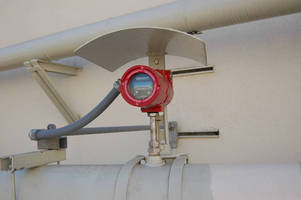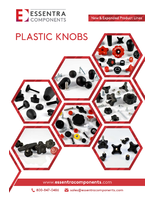Sierra Plays Pivotal Role in Biogas Production Resulting in High Energy Savings for California Wastewater Treatment Facility

MONTEREY, CA - In the conversion of solid wastes to high-efficiency fuel, digestion plays a critical first step in producing raw biogas. For Santa Cruz Wastewater Treatment Facility, Sierra's Immersible Thermal Mass Flow Meters deliver critical readings indicating exact digestive status while controlling the final step of precisely blending the cleaned and compressed biogas with natural gas.
Since 1989 this state-of-the art wastewater treatment facility, nestled in a shallow canyon in the coastal city of Santa Cruz, has been leading the way for renewable energy programs and environmental protection in the West. Santa Cruz Wastewater generates their own electric power by using internal-combustion engines which burn a mixture of methane gas produced by the sewage digestion process and purchased natural gas, producing 7.4 million kwH of electric power per year.
Historically, wastewater treatment facilities around the globe have used differential pressure devices for their gas measurements. These devices proved to be expensive to maintain, clogged easily, and required a separate pressure and temperature transducer and flow computer to deliver true mass flow.
Valuing responsive customer service and low maintenance costs, Santa Cruz Wastewater decided to change vendors in the Spring of 2002 and chose Sierra Instruments, a leader in thermal mass flow technology. As a result of substantially improved performance, all of their meters were replaced with Sierra's Immersible Thermal Mass Flow Meters by 2007.
Santa Cruz Wastewater Captures Bio-Gas for Energy Production
Producing abundant, healthy amounts of biogas each day in their digesters is the cornerstone of Santa Cruz Wastewater Treatment Facility's unique renewable energy program. Acting like a large stomach, the solids from the wastewater treatment process are "digested" in four large domed digesters, and then heated to 98 degrees for optimal digester gas production. When methane forming bacteria breaks down the acids in the digester, large amounts of anaerobic digester gas, made up of 60 % methane and 40% C02, are produced. Facility operators, the "brains" of this stomach, use their Supervisory Control & Data Acquisition (SCADA) computer system to check that each digester is producing optimal amounts of digester gas. If the digester gas readings are low, the "stomach" is upset, so the operators will check various process parameters like PH levels, alkalinity ratios, temperatures and feed rates to increase the production of digester gas.
Since digester gas applications operate at relatively low pressures, it's essential that instrumentation has the ability to remain accurate in those conditions, a capability that orifice plates lack. Immersible Thermal Mass Flow Meters create virtually no pressure drop and accurately measure these low flow rates. With Sierra's thermal technology installed, Santa Cruz Wastewater can measure true mass flow directly, have outstanding 40:1 rangeability, an accuracy of ±1.0% of reading plus 0.5% full scale, and repeatability of ±0.2% of full scale.
Bio-Gas Helps Fuel Engines for Cogeneration System
According to Al Locatelli, Co-Gen and Standby Generator Specialist, converting this raw biogas into fuel for their internal combustion engines is no simple task, but it is what makes Santa Cruz Wastewater Treatment Facility unique. Their Waukesha 7042 GLD 820KW engine, coined Cogeneration 1, burns a mixture of digester gas and purchased natural gas which is mixed with air to lower the BTU levels closer to digester gas. This biogas enters a manifold system, goes through a scrubber to remove the H2S, a harmful greenhouse gas, and a chiller unit to remove the moisture from the gas. Compressed from 7 inches of water column to 3 psi, the gas enters a second carbon scrubber to remove siloxanes which can harm the engines. In their static inline mixer, this cleaned and compressed biogas is mixed with the diluted natural gas to maintain the optimal gas blend of 80% digester gas and 20% purchased natural gas. If the mass flow rate of digester gas decreases, more diluted natural gas enters the blend, ensuring that very little digester gas has to be flared off.
After passing through a particle filter, this mixed gas is finally ready to fuel up the Waukesha 7042 GLD engine. To improve engine performance, a high BTU shot of natural gas is injected into the pre-combustion engine chamber using admission valves to ignite the lean fuel mixture in the cylinders. The thermal meters provide a more efficient way for troubleshooting engine problems for optimizing efficiency.
By reusing their methane, Santa Cruz Wastewater Treatment Facility prevents 41 tons of CO2 emissions (a potent greenhouse gas) from polluting our atmosphere. At times, however, especially when Cogeneration 1 is down, they must flare off extra bio-gas that needs to be measured. Mike Sanders, Facility Operations Manager, notes that the accuracy of their instrumentation is critical, not only for process control purposes, but for reporting through regulatory permit requirements to the Monterey Air Board. Soon reporting will be necessary for the AB32 greenhouse gas requirements, which measure digester gas produced, digester gas burned in the engines, and digester gas flared to the atmosphere.
Harnessing Alternative Energy Saves Money in Energy Costs
By using the sophisticated SCADA system and their ION Meter, which automatically calculates their monthly energy bill, Dave Meyers, Senior Plant Operator, makes important energy saving decisions each day. Using about 1.3 megawatts, the plant can't run solely on the 820kW produced by Cogeneration 1. During the week, between noon and 6pm Monday through Friday, May through October, energy rates jump from 11 cents a kilowatt hour to 11 dollars a kilowatt hour, which includes on-peak demand charges. To break these peak demand times, at 11:30 Meyers and other operators fire-up their Waukesha 3521 GLD lean burn engine, coined Cogeneration 2, which produces 440 kW of energy, but runs solely on purchased natural gas at 14 cents a kwH. Meyers and other operators save Santa Cruz Wastewater Treatment Facility money on energy by choosing to pay for the natural gas to run Cogeneration 2 during peak demand times rather than importing expensive energy from PG&E at $11 a kilowatt hour.
"We just want something that works. We needed a turn-key solution. Sierra did that and much more," states Meyers.
Visit sierrainstruments.com/chronicles/stories/santa_cruz_wwtf.html for more applications.
View Immersible Thermal Mass Family Product Page for more product information http://sierrainstruments.com/products/heavyindustry.html.
Press Contact:
Maryadine Washington
831-373-0200
FAX 831/-373-4402
m_washington@sierrainstruments.com
Technical Contact:
Scott Rouse, Product Manager
800/866-0200
FAX 831/373-4402 s_rouse@sierrainstruments.com




